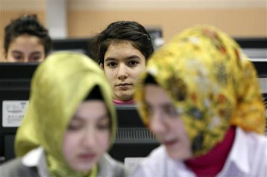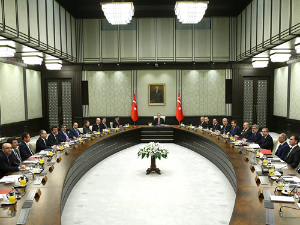Turkey’s Journey from Secularism to Islamization: A Capitalist Story
By Halil Karaveli
May 13, 2016
The dynamics of capitalist development have played a much more central role for Turkey’s journey from secularism to religious conservatism – and before that for the Kemalist break with Islam – than what is generally recognized. During the context of the Cold War, capitalist development and Islamization went hand in hand, as religious conservatism neutralized the challenge of the left and labor. Today, neoliberal globalization provides impetus for Islamization. Raising “pious generations” – who are “traditional,” not rebellious – is essential for sustaining neo-liberalism. An explicitly “religious” constitution, in which reference is made to God, will serve to mask that it is capital that reigns supreme. Ultimately, the survival of secularism requires that the economic order that depends on continued Islamization is called into question.
The Rise of Diyanet: the Politicization of Turkey’s Directorate of Religious Affairs
By Svante Cornell
October 9th, 2015, The Turkey Analyst
Since 2010, the State Directorate for Religious Affairs has risen in prominence. Diyanet’s budget has quadrupled under the AKP, and the Directorate now issues fatwas on demand, as well as wading into political issues and backing up the AKP position. Moreover, Diyanet has drastically increased its provision of Quran courses for students of all ages. The Diyanet, originally created by the Turkish state to exercise oversight over religious affairs, is now firmly under the control of President Erdoğan, and has turned into a supersized government bureaucracy for the promotion of Sunni Islam.
The Islamization of Turkey: Erdoğan’s Education Reforms
By Svante E. Cornell (vol. 8, no. 16 of the Turkey Analyst)
The growing efforts at Islamization of Turkish society have largely gone unnoticed. For many years, Islamization was the dog that did not bark: in spite of dire predictions by secularists, the AKP did not introduce conspicuous efforts to Islamize Turkey. But since 2011, this has changed. The main exhibit is the education sector, which President Recep Tayyip Erdoğan has remodeled to instill considerably more Islamic content, in line with his stated purpose to raise “pious generations”. Ultimately, the Islamic overhaul of the education system is bound to have implications for Turkey’s civilizational identity, and on the choices it will make on where it belongs politically.

Turkey’s New Caretaker Government is a Pure AKP Government in Disguise
By M. K. Kaya (vol. 8, no. 16 of the Turkey Analyst)
In violation of the Turkish constitution, Ahmet Davutoğlu’s new caretaker cabinet is a pure AKP government. The government may be temporary, but it is nonetheless nothing but an expression of the determination of the AKP to secure permanent power. Both the process that led to its formation and its extra-constitutional composition bears testimony to the power-grab of the AKP.
The Long Road that Led to the AKP’s “New Turkey”
By Fatih Yaslı (vol. 28, no. 1 of the Turkey Analyst)
The regime that the AKP is constructing certainly deserves to be defined as “new.” However, a proper understanding of the rise of the Islamists requires that their ascent is put in the right historical context, and that the true nature of the old Turkish regime is appreciated. Turkey’s Islamization has a long prehistory. It has been a long time since the radicalism of Kemalism was discarded. Instead, religion and conservatism have been consistently promoted in the name of anti-socialism.






